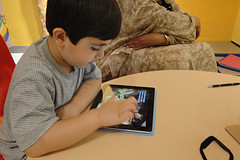 I wasn’t going to blog about the American Academy of Pediatrics recent update to its 1999 policy statement, which discouraged media use for children under the age of 2. Why not? Because numerous experts much more knowledgeable than I already provided excellent commentary on the report. Both Warren Buckleitner and David Kleeman effectively summarized the statement’s inadequacies. Moms with Apps did a nice job interpreting the report into usable tips for parents. And Sesame Workshop’s Jennifer Kotler and Rosemarie Truglio discussed how more research is needed to assess the impact and potential of media on parents and children in today’s complex media landscape. I felt that the AAP’s updated statement was … well … not really updated. I didn’t have much to add.
I wasn’t going to blog about the American Academy of Pediatrics recent update to its 1999 policy statement, which discouraged media use for children under the age of 2. Why not? Because numerous experts much more knowledgeable than I already provided excellent commentary on the report. Both Warren Buckleitner and David Kleeman effectively summarized the statement’s inadequacies. Moms with Apps did a nice job interpreting the report into usable tips for parents. And Sesame Workshop’s Jennifer Kotler and Rosemarie Truglio discussed how more research is needed to assess the impact and potential of media on parents and children in today’s complex media landscape. I felt that the AAP’s updated statement was … well … not really updated. I didn’t have much to add.
But in two weeks since the statement was released, I’ve gotten numerous questions on my thoughts about the guidelines. Not so much from industry colleagues, but from fellow parents — friends, family, moms at playgroup — concerned that they are not abiding by the recommendation to keep their young children’s lives as “screen-free” as possible. I hear the panic in their voices as they ask me if my daughter, old enough that she doesn’t shove the iPad in her mouth but still under the golden age of two, lives a “screen-free” life. I hear their relief when I assure them that she doesn’t.
While my blogs always come about as combination of my roles as a mom and as someone who works in children’s media, they usually have a professional focus. I tend to keep my personal experiences out of it — mainly because our primary audience is industry, but also because my daughter is only now starting to consume media. But this time, it felt more relevant and it felt more personal. So with a big “I’m-not-a-doctor” caveat, here is a story that highlights why I feel the statement falls short.
I was excited to get to work on October 18th. The industry had been anticipating the AAP’s update to its policy on young children and media, and many had speculated that they would be modifying their recommendation to limit screens with the under-twos. But when I got to my email and saw the release courtesy of Scott Traylor, I didn’t open it. I got distracted by an email from What to Expect, my daily newsfeed on all things parenting. The title of the day’s email: “Does Your Child Need a Multivitamin?”
Gasp. My pulse quickened. My daughter doesn’t take a multivitamin. It’s never even occurred to me to give her one. So I opened the article, pulling out my car keys ready to head to the nearest drug store. But what I read left me unsatisfied. The article listed both reasons for and against giving a multivitamin. It gave tips on how to select a multivitamin, should I decide to use one. But in terms of answering the question, the answer was indefinite: “Experts haven’t come to a consensus on whether or not toddlers should take multivitamins, and the American Academy of Pediatrics doesn’t have an official position on the subject. That means it’s up to you along with your doctor to decide what’s best for your growing child.”
Feeling unsatisfied — albeit somewhat relieved that I had not been doing anything drastically wrong as a parent — I committed to further probing the issue after hours. I turned to work emails, at which point I read the AAP’s press release, entitled: “Babies and Toddlers Should Learn from Play, Not Screens“. I once again felt frustrated — this time for the opposite reason I had earlier this morning. I had a cut and dry answer. But given my professional expertise, I knew this answer didn’t have adequate research to support its headline, and would actually argue that it is nonsensical, because nowadays you can play on screens.
When you read the statement, it becomes somewhat clear that they are referring to television only. But I’m concerned that few will make it past the stressful headline and corresponding media-storm it produced. The statement actually includes a number of helpful guidelines around television: avoid TV in the bedroom; don’t have it on as background noise; media companies often make unsubstantiated educational claims. These tips are important, but I’m worried they will be overshadowed by a headline that will just produce guilt and fear in parents when what they really need is guidance. I understand that perhaps there isn’t enough research for the Academy to make a statement on interactive media one way or another, but their “updated” statement was misleading.
As a media professional, the AAP statement left me frustrated because I think it further complicates our job in helping parents navigate the complex media world today’s children are growing up in. But as a mom, the AAP statement made me rethink my response to the multivitamin debate. While I had initially been annoyed that it didn’t give me a cut and dry response, I now recognize that it’s forcing me to legitimately consider whether my daughter needs to take vitamins. To research the pros and cons, to look at her diet and decide if it’s balanced, and — if I’m still not sure what to do — to consult her pediatrician.
As parents, we want rules. We want clarity. I want to know — does my child need or not need a multivitamin. But sometimes the answer is simply not that black and white. The AAP says babies and toddlers should learn from play, not screens. But nowadays you can play on screens. Realistically, screen time is part of our children’s lives at every age, so what parents really need is guidance on turning media consumption into rich, intergenerational, interactive experiences that allow children do exactly what the AAP advocates — to learn through play. Sometimes, the answer is simply not that cut and dry.
Download the AAP’s press release (PDF).
Photo: Some rights reserved by Wayan Vota on flickr.




